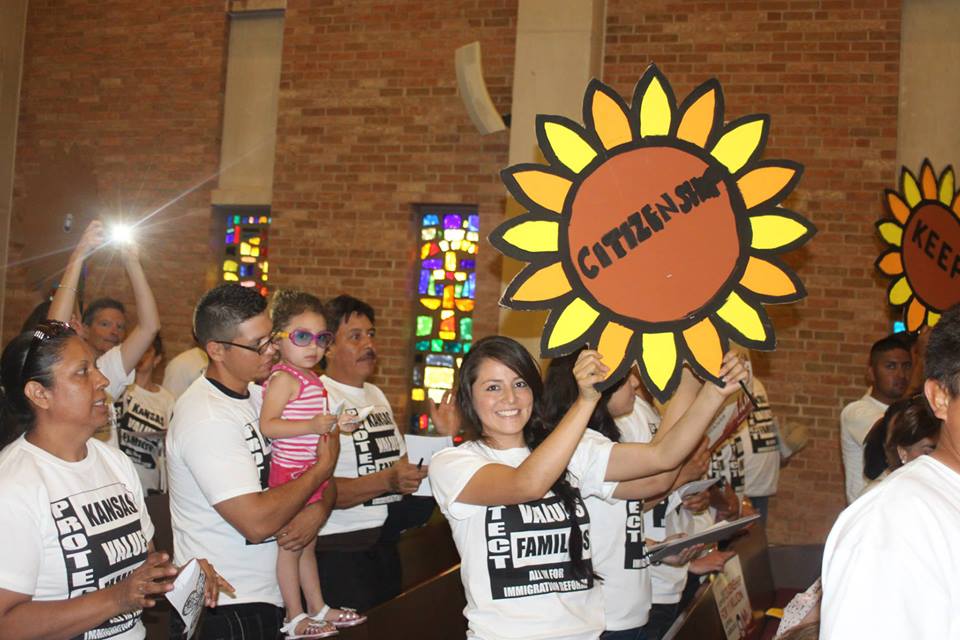Sunflower Community Action
 Over twenty years ago, a few concerned community members of a predominantly African-American neighborhood in Wichita, Kansas began meeting in a room in one member’s house to discuss an issue they felt was important to the entire community: affordable housing. Little did they know that these meetings would plant the seeds for Sunflower Community Action, an organization with 1,800 members, including large numbers of former prisoners and recent immigrants, that tackles complex but interconnected issues such as voter registration, prisoner reintegration, immigration reform, and worker justice. As reflected by its diverse constituency and agenda, Sunflower's core mission is to “give voice to the voiceless and underserved in our community.”
Over twenty years ago, a few concerned community members of a predominantly African-American neighborhood in Wichita, Kansas began meeting in a room in one member’s house to discuss an issue they felt was important to the entire community: affordable housing. Little did they know that these meetings would plant the seeds for Sunflower Community Action, an organization with 1,800 members, including large numbers of former prisoners and recent immigrants, that tackles complex but interconnected issues such as voter registration, prisoner reintegration, immigration reform, and worker justice. As reflected by its diverse constituency and agenda, Sunflower's core mission is to “give voice to the voiceless and underserved in our community.”
One of Sunflower’s biggest challenges is combating anti-immigration policies and sentiment in Wichita and Kansas. Most conspicuously, Kris Kobach, Kansas’s Secretary of State, is a member of the conservative American Legislative Exchange Council (ALEC) and the partial author of anti-immigration legislation not just for Kansas, but also for states such as Texas, Nebraska, Alabama and Arizona. Indeed, he helped draft Arizona’s infamous Senate Bill 1070, or the Support Our Law Enforcement and Safe Neighborhoods Act, one of the strictest anti-immigration laws on the books and a law that encourages rampant racial profiling according to the ACLU. Thanks to people in power like Kobach, official narratives such as the one that claims immigrants take the jobs of Americans, have frayed relations between the historic African-American population of Wichita and its newer Latino population. Sunflower, however, has taken on the important work of bridging these communities in new and inspiring ways. To give just one example, Sunflower plans on hosting a series of community workshops called “The Black and Brown Connection: Getting Beyond the Rhetoric,” focusing on the intersections of race, religion, and politics. Thanks to efforts like these, Reuben Eckels, Director of Special Projects, believes that the Sunflower community is increasingly realizing that “our immigrant brothers are a positive fit for Wichita and Kansas. The issues that affect them affect us.”
Impressively, Sunflower regularly turns out anywhere from 200 to 300 people to legislative meetings in both Wichita and Topeka, the state capital. In all likelihood, its success with mobilization lies in striking a balance between advocating on issues of citywide, statewide, and even national concern with highly local initiatives such as community clean-ups of dilapidated blocks and “greening” homes of low-income individuals. In Reuben’s words, “once [community members] hear us championing the community and not just doing what we think is best...they really come to our side.”
With such a strong community presence, Sunflower has grand plans for the future. It just recently opened its Worker Justice Center, a collaborative venture between Sunflower, the Wichita-Hutchinson Labor Federation, Interfaith Worker Justice, and SEIU Local 513. Already, the Worker Justice Center has won millions of dollars in settlements for victims of wage theft and wrongful injury and has helped put a bill in the Kansas legislature that would reduce the incidence such injustices in the first place. Sunflower is also making preparations to own and operate its very own LPFM station. Located in their primary facility, the station will serve as a space for collaboration between individual community members and artists as well as the many organizations in Sunflower’s network, including churches, synagogues, mosques, unions, and universities. With fifteen to twenty businesses already signed up to be underwritten by Sunflower’s station, it is destined for a sustainable existence broadcasting content by and for the Wichita community.
